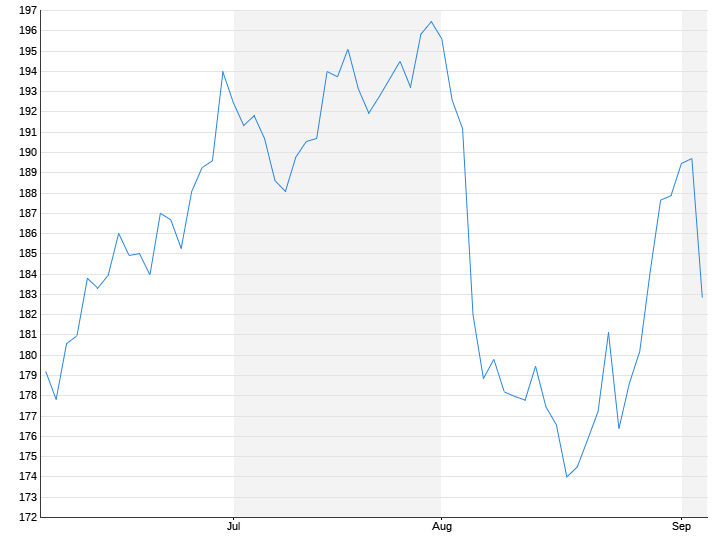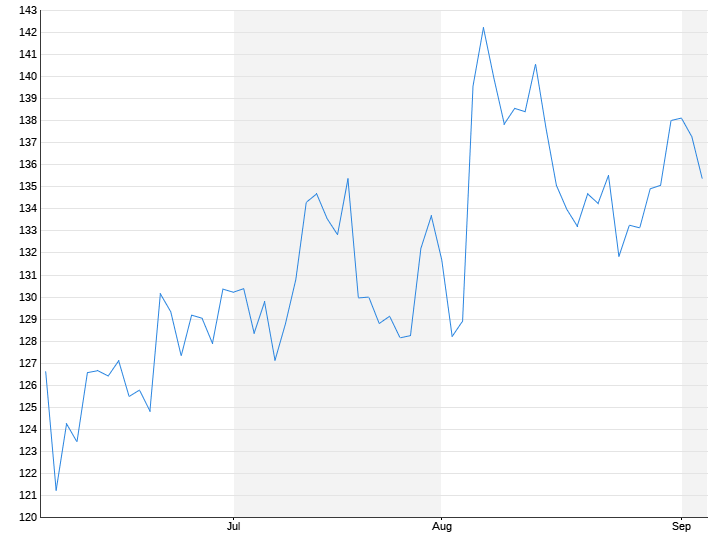Wall Street down
Oil price causes losses on US stock exchanges
09/06/2023 10:58 p.m
listen to the article
This audio version was artificially generated. More Info | send feedback
The US stock exchanges suffer price reductions in the middle of the week. Concerns about inflation, fueled again by higher oil prices, are proving to be a burden. Rising inflation could force the US Federal Reserve to leave interest rates at their high level for a longer period of time.
Wall Street continued its negative trend in the middle of the week. Strong economic data fueled interest rate concerns and pushed up bond yields. They had already risen sharply the day before after oil prices had risen significantly. The Dow Jones Index fell 0.6 percent to 34,443 points. The S&P 500 lost 0.7 percent that Nasdaq Composite lost 1.1 percent. According to initial information, there were 1,095 (Tuesday: 663) winners, 1,804 (2,283) losers and 88 (62) unchanged titles on the Nyse.
“Market sentiment remains depressed with little improvement in sight as oil prices remain elevated and inflation fears resurface,” said Susannah Streeter, Hargreaves Lansdown’s head of money and markets.
Among the economic data was above all the ISM index for the non-manufacturing industry. He turned out a lot stronger than expected. Against that left Beige Book hardly any traces on the market. It noted that economic activity had grown moderately in most regions and that inflation had slowed.
Oil prices continue to rise
The oil prices extended their strong gains from the day before. The trigger was reports that Saudi Arabia and Russia want to extend their funding cuts. Brent had climbed above $90 a barrel for the first time since November. The three-month extension is longer than many analysts were expecting.
The dollar maintained his recent serves. The euro has stabilized at lower levels, trading at $1.0728. Currency analyst You-Na Park-Heger from Commerzbank attests that the euro is currently in a difficult position. Doubts as to whether the European Central Bank (ECB) will tighten its monetary policy further seem to be increasing. She pointed to dovish comments from ECB officials, such as Chief Economist Philip Lane.
The gold price fell for the fifth consecutive trading day. The increased yields and the strong dollar weighed on the interest-free precious metal, it said. The price of gold should remain stable until the end of the year, according to analysts at BMI. The possibility of another rate hike by the US Federal Reserve could add short-term pressure as investors focus on the dollar. Towards the end of the year, however, gold’s appeal as a safe haven should return “if the US slides into a mild recession in the first half of 2024 and the US Federal Reserve ends its cycle of rate hikes.”
Amazon threatens antitrust lawsuit – Apple under pressure
Lost in the individual values Amazon-Share 1.4 percent. According to the Wall Street Journal, citing people familiar with the matter, the company has not offered any concessions to the competition authority to settle antitrust lawsuits. This paves the way for a lawsuit against Amazon, which the agency is planning later this month.

The European Union also takes Apple (-3.6%), Amazon and the Facebook parent Meta (-0.3%) targeted. They are on a list of six Internet companies published in Brussels on Wednesday, for which stricter rules in favor of users are to apply from next year. This also includes Microsoft (-0.2%), the Google parent company Alphabet (-1%) and the Chinese Bytedance group, which operates the video portal Tiktok. At Apple, the fact that China, according to government officials, forbids the use of an iPhone at work should have been an additional burden.
